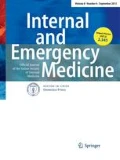References
Szczech LA, Lazar IL (2004) Projecting the United States ESRD population: issues regarding treatment of patients with ESRD. Kidney Int Suppl 90:S3–S7
Hirsh J, Raschke R (2004) Heparin and low-molecular-weight heparin: the seventh ACCP conference on antithrombotic and thrombolytic therapy. Chest 126:188S
Hirsh J, Anand SS, Halperin JL, Fuster V (2001) Guide to anticoagulant therapy: heparin: a statement for healthcare professionals from the American Heart Association. Circulation 103:2994
Perry DJ (1994) Antithrombin and its inherited deficiencies. Blood Rev 8:37
Weitz JI (1997) Low-molecular-weight heparins. N Engl J Med 337:688
Hirsh J, Levine MN (1992) Low molecular weight heparin. Blood 79:1
Warkentin TE, Levine MN, Hirsh J et al (1995) Heparin-induced thrombocytopenia in patients treated with low-molecular-weight heparin or unfractionated heparin. N Engl J Med 332:1330
Bhandari M, Hirsh J, Weitz JI et al (1998) The effects of standard and low molecular weight heparin on bone nodule formation in vitro. Thromb Haemost 80:413
Monreal M, Lafoz E, Olive A et al (1994) Comparison of subcutaneous unfractionated heparin with a low molecular weight heparin (Fragmin) in patients with venous thromboembolism and contraindications to coumarin. Thromb Haemost 71:7
van Dongen CJ, van den Belt AG, Prins, MH, Lensing, AW (2004) Fixed dose subcutaneous low molecular weight heparins versus adjusted dose unfractionated heparin for venous thromboembolism. Cochrane Database Syst Rev CD001100
Schraibman IG, Milne AA, Royle EM (2001) Home versus in-patient treatment for deep vein thrombosis (Cochrane Review). Cochrane Database Syst Rev 2:CD003076
White RH, Ginsberg JS (2003) Low-molecular-weight heparins: are they all the same? Br J Haematol 121:12
Nagge J, Crowther M, Hirsh J (2002) Is impaired renal function a contraindication to the use of low-molecular-weight heparin? Arch Intern Med 162:2605
Thorevska N, Amoateng-Adjepong Y, Sabahi R et al (2004) Anticoagulation in hospitalized patients with renal insufficiency: a comparison of bleeding rates with unfractionated heparin vs enoxaparin. Chest 125:856
Monreal M, Falga C, Valle R et al (2006) Venous thromboembolism in patients with renal insufficiency: findings from the RIETE Registry. Am J Med 119:1073
Siguret V, Pautas E, Fevrier M et al (2000) Elderly patients treated with tinzaparin (Innohep) administered once daily (175 anti-Xa IU/kg): anti-Xa and anti-IIa activities over 10 days. Thromb Haemost 84:800
Chow SL, Zammit K, West K et al (2003) Correlation of antifactor Xa concentrations with renal function in patients on enoxaparin. J Clin Pharmacol 43:586
Lim W, Dentali F, Eikelboom JW, Crowther MA (2006) Meta-analysis: low-molecular-weight heparin and bleeding in patients with severe renal insufficiency. Ann Intern Med 144:673
Lim W Low-Molecular-Weight Heparin in Patients with Chronic Renal Insufficiency. Intern Emerg Med doi:10.1007/s11739-008-0164-9
Conflict of interest statement
The authors declare that they have no conflict of interest related to the publication of this manuscript.
Author information
Authors and Affiliations
Corresponding author
Rights and permissions
About this article
Cite this article
Netti, G.S., Margaglione, M. & Gesualdo, L. How to handle low-molecular-weight heparins in patients with decreased renal function: an open issue. Intern Emerg Med 3, 307–309 (2008). https://doi.org/10.1007/s11739-008-0195-2
Received:
Accepted:
Published:
Issue Date:
DOI: https://doi.org/10.1007/s11739-008-0195-2

